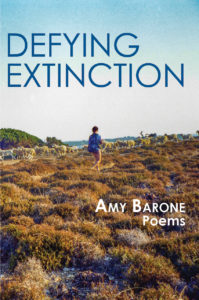 Review by DeMisty D. Bellinger
Review by DeMisty D. Bellinger
In Amy Barone’s latest collection of poetry, Defying Extinction, she delves into the environment, the natural world, family, grief, and growth. She affords each topic considerable care. Divided into five sections, the volume shows how personal yet how mysterious the world can be. Barone balances ecocritical commentary and existentialism in invitingly gorgeous poems.
The first section of the book is entitled “Sacred Places,” and most of the poems feature specific locales throughout the world—the Americas, Europe, and Africa—as well as celestial bodies. And as well as the animals and lands, Barone showcases the peoples in each of these places, including enslaved Americans, Native Americans, and First Nation South and Meso-Americans.
This section begins with the poem “Survivors,” in which Barone chronicles resilient animals, and then moves to her own resilience. “Cahows re-emerged on Bermuda’s Nonsuch Island / after a 300-year absence” the first two lines read, then on to soft-shelled crabs on Tangier Island, plovers in New York, and so on, until the last stanza, where she states, “Me—I’m the woman with medicine in her voice,” and continues on with a few more nods to the natural world.
Though a hefty part of the book is serious and, sometimes, somber, Barone makes room for playful or whimsical poems, but even these are not without a tinge of the morose. For instance, in the poem “Mars Bound,” the speaker signs up for a chance to go to Mars. The poem both allows for the wonder and mystery that is Mars with the desire to leave the bleakness here on Earth.
Barone’s language throughout is accessible, but she enhances with imagery and lyricism. Also, almost always she seems to find the mots justes. The poem “Bearly” is about Italian brown bears and appears in the section “The Wild.” The bears are presented as precocious beasts who are nearing extinction. The alliteration of the B sound throughout and the use of percussive monosyllabic terms lend to the rhythm and musicality of the poem: “Abruzzo’s Brown Bears, / calm creatures” and later, with the lines “Fifty Marsican bears, activists for ecotourism, / remain—to search for beloved Buckthorn berries,” she continues the alliterative device and introduces the concern for these animals. This tone change happens quickly: the introduction of the brown bears to the end with tourism and hibernation, is only twelve lines long.
The other sections of the book are “Heirlooms,” “Love & Family,” and “Anima Protection.” In “Heirlooms,” the poems travel through international art galleries and world mythology via the speaker’s travels throughout the world. Also, in this section, we get more of a sense of who the speaker’s mother was through poems that grieve her. The grief is allowed to grow more in the section “Love & Family.”
The last section of the book returns to some playfulness with “Wizard-ess,” a poem which is about playing pinball and works as a response to The Who’s “Pinball Wizard.” But Barone moves away from play with two ethereal dream poems and poems of forgetting and friendship. “Dolce Far Niente,” a lament and a wish, begins “I miss what once was / and a little of what followed.” Though she doesn’t mention isolation and change brought on by the pandemic, there are allusions to what COVID-19 has taken from us. This is the poem that ends the book.
Defying Extinction is about survival or, at the very least, co-habituating with the frayed world we’ve created, often in unexpected places. With grace and honesty, Amy Barone collects these seemingly disparate topics in this poignant collection.
Defying Extinction by Amy Barone
Broadstone Books, 2022, $25 [paper],
ISBN Number 9781956782110
DeMisty D. Bellinger is the author of the poetry collections Rubbing Elbows and Peculiar Heritage and of the novel New to Liberty. She teaches writing in Massachusetts, where she lives with her husband and twin daughters. You can find her at demistybellinger.com.
